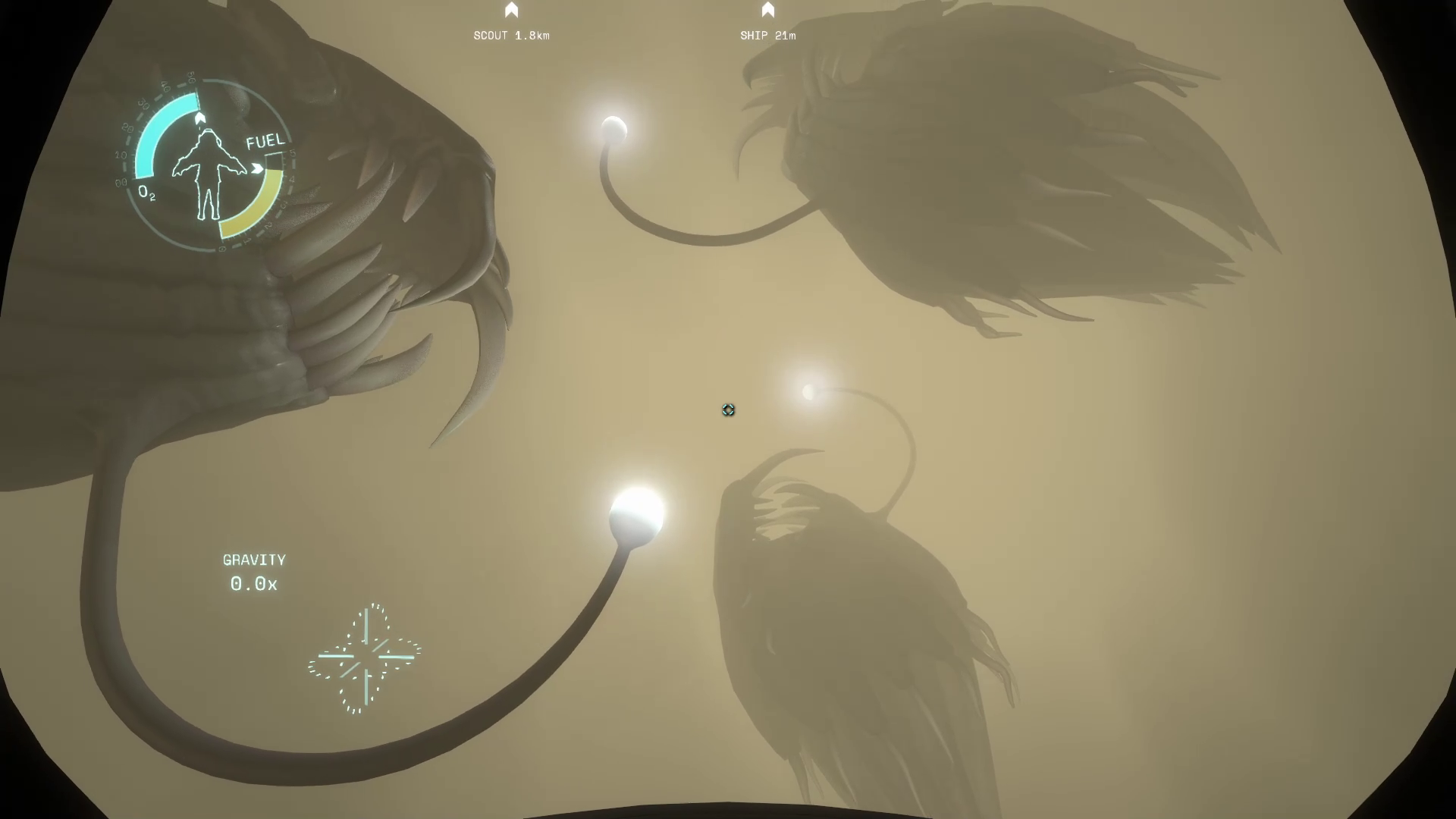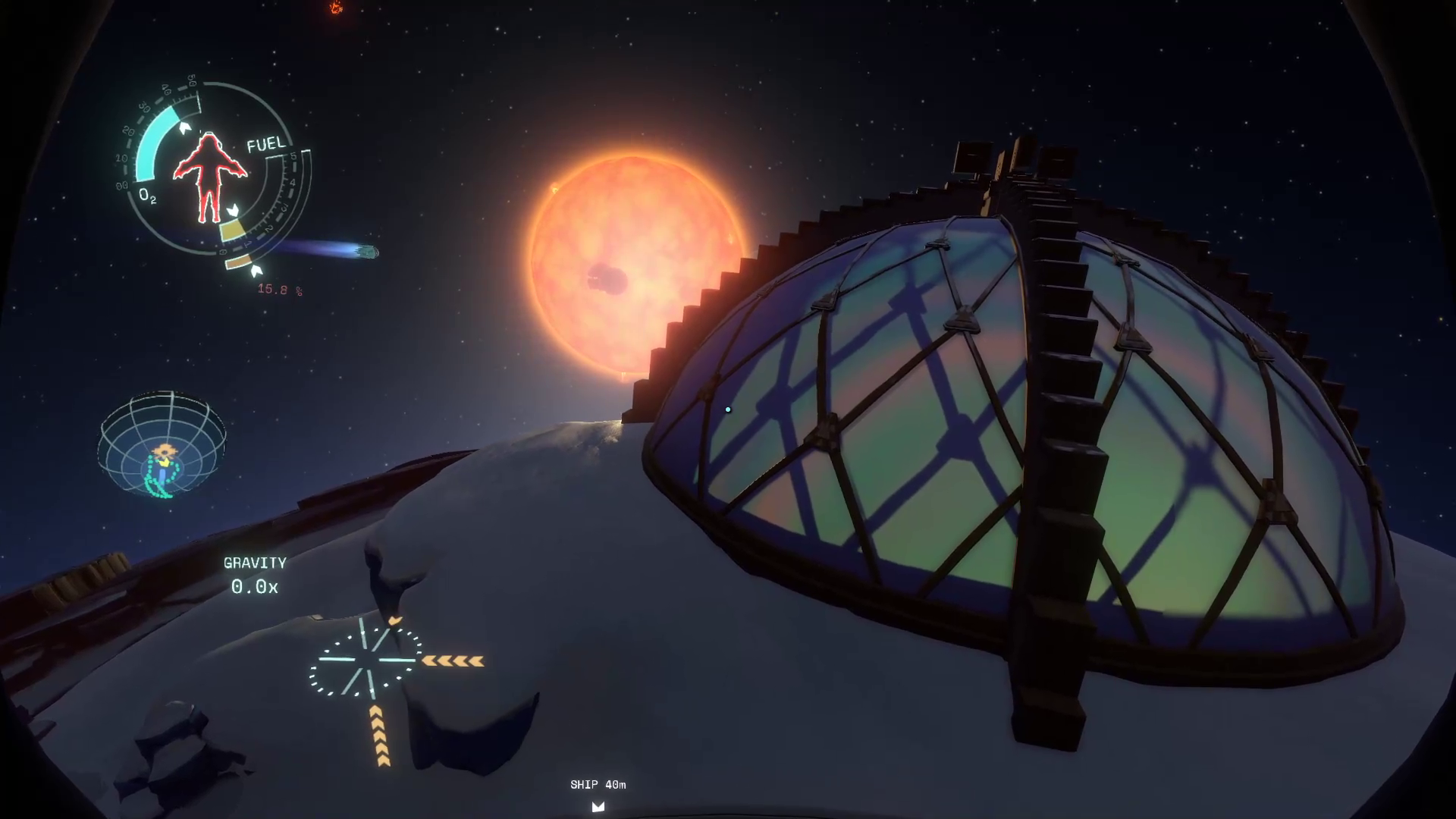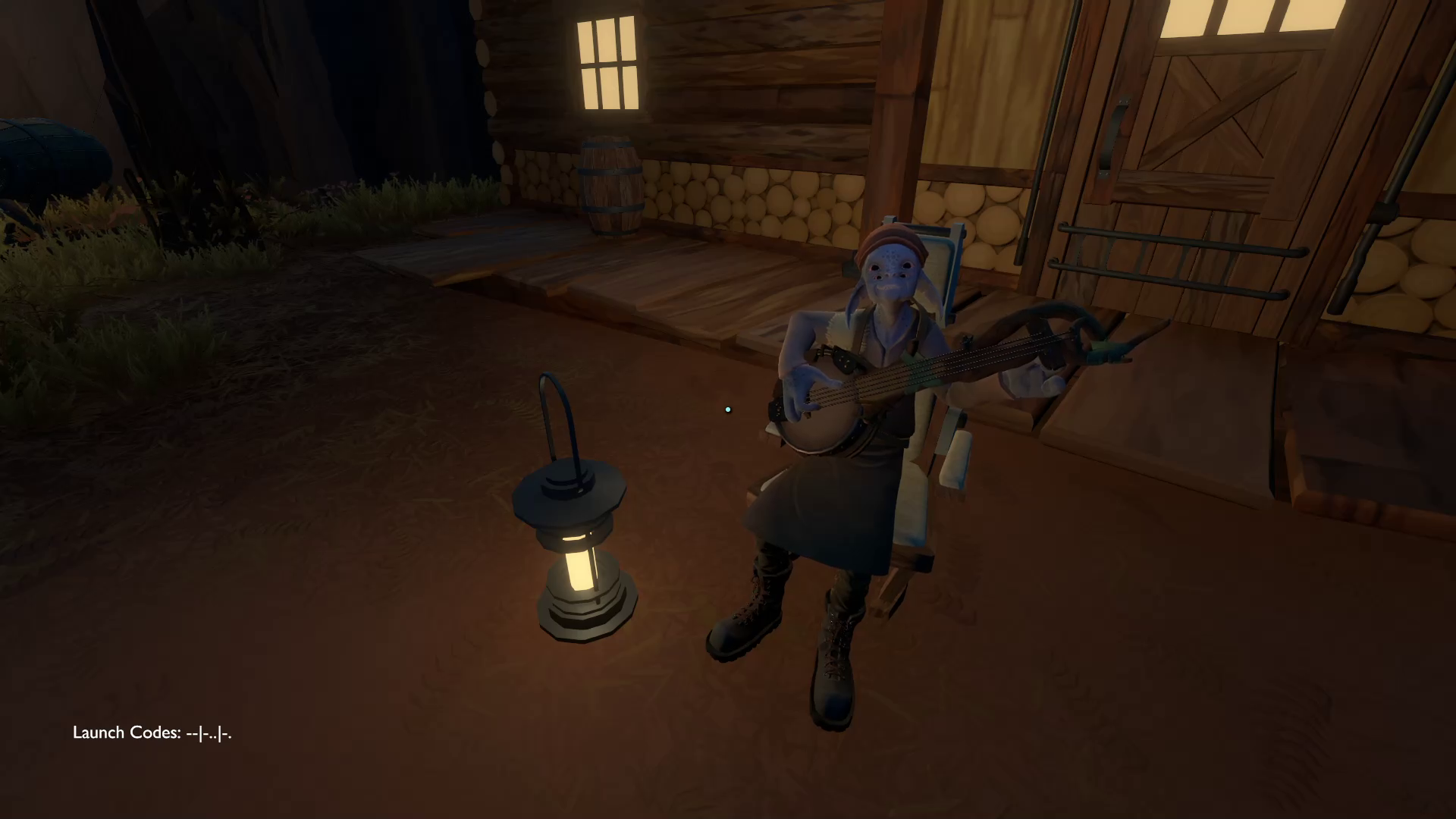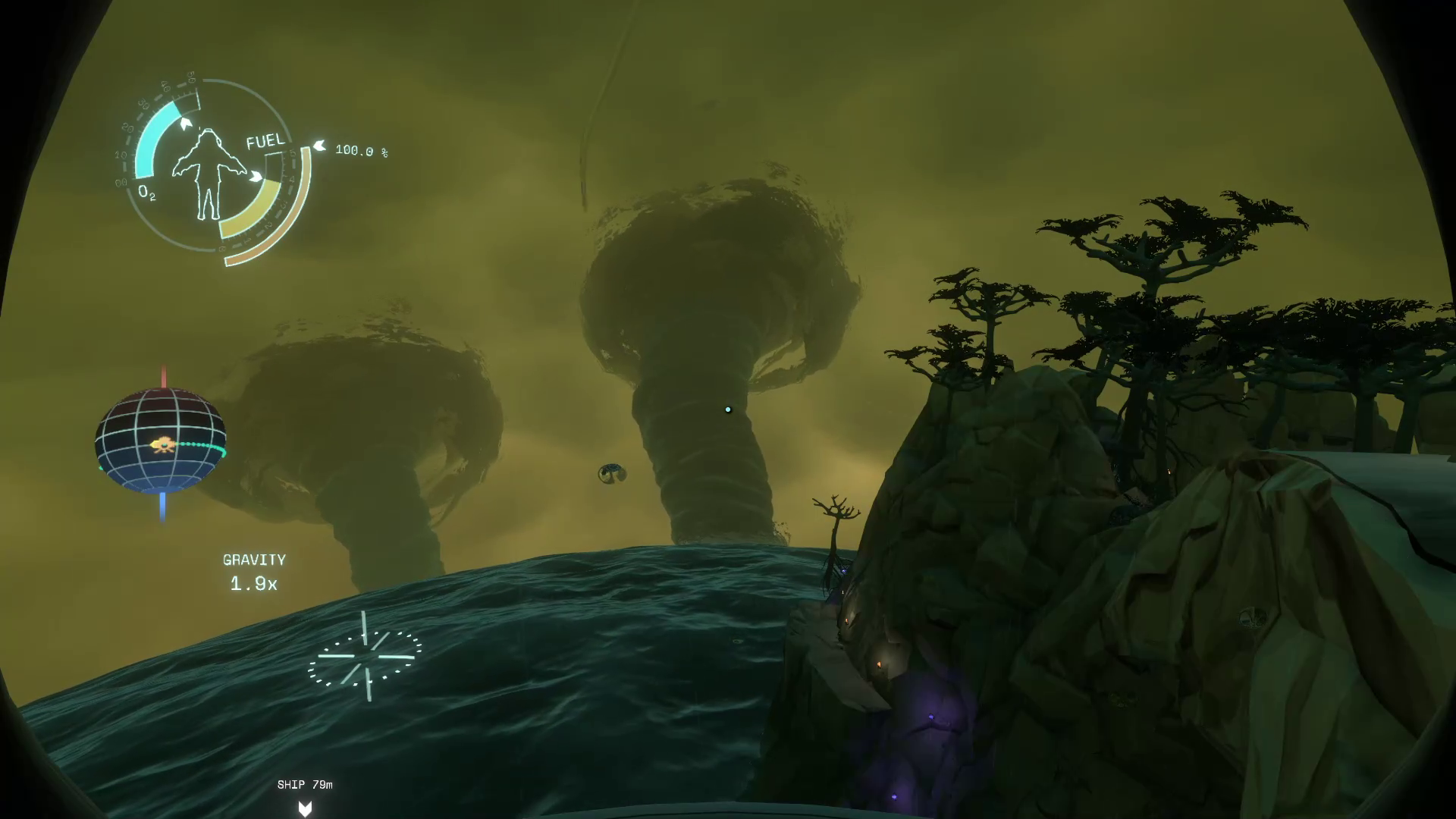Outer Wilds (not The Outer Worlds)
Outer Wilds has five BAFTA Video Game nominations this year — original property, game design, narrative, music and best game — which are all incredibly well deserved. Let's dispel the association with The Outer Worlds very quickly. The Outer Worlds is a space exploration first-person shooter role-playing game developed by Obsidian Entertainment in 2019. Outer Wilds is a space exploration first-person action adventure puzzle game developed by Mobius Digital in 2019. Despite appearances, these games are incredibly different. Frankly, The Outer Worlds — which only received one nomination, for narrative — can't hold a candle to Outer Wilds.
I'm going to talk about Outer Wilds soon, I promise, but I feel the need to get some thoughts about The Outer Worlds off my chest. The Outer Worlds was a highly anticipated release, being put together by people behind some incredibly well-regarded games, like Star Wars Knights of the Old Republic II: The Sith Lords and Fallout: New Vegas. By all accounts the game should have been a masterpiece.
It was fine. There were some nicely developed characters and the gameplay was fun, but (conjecture ahead) it lacked a lot. It lacked energy; verve; passion. The worlds felt empty and limp. Clearly a lot of thought had gone into the lore and the story behind each settlement, but rarely could it be felt in the atmosphere. Despite the prestige behind this project, it felt curiously sterile and blank.
The same accusation could never be fairly leveled at Outer Wilds. Every inch of the world and the way the game plays feels hand-crafted with love and included for a reason. In a game where you are encouraged to just go out into the solar system and see what you can find, it is so incredibly important that the world feels real. It makes every discovery meaningful. It makes you feel like a real explorer; like, as Ian Higton so aptly put it, you are the first person ever to discover the things you're discovering.
Before gushing further into an unstructured mush, listing off all the things I love about Outer Wilds and what it represents, I'd like to rein it in. Perhaps the best way to express my love for each facet of this gem of a game is to address each of its nominations and pick apart why it deserves to win.
Original Property
Although the BAFTAs public facing pages lack a clear definition for the award, Original Property seems to be reserved for outstanding new IP: the best game that's completely fresh on the scene (I asked the chair of the Scottish BAFTA Video Game committee to confirm this and he said, "Yeah, I believe so!"). That's all well and good, but I'll be talking about Best Game later. Perhaps it's much easier for me to frame this discussion around the award's previous name: Originality, which Outer Wilds has in spades.
Setting you off into the world for the first time is just one way the game shows this off. You are a member of an alien race, living in a primitive alien village, which seems to revolve around one thing: their space programme. Yes, the inhabitants of the rickety-looking wooden huts who build observation platforms into trees seem to collectively love the idea of assembling spaceships and sending people out in them to explore what lies beyond the atmosphere. They don't really have a goal or a guiding light, so neither do you. Speaking to people in the village, you'll be given all sorts of well wishes and anecdotal advice about your first trip into space, but if you ask them where you should go they won't give you a clear answer. A comet has just appeared in the solar system — you could go there. One of the other travellers went to a planet called Giant's Deep, you could go chat to him. Or if you want a really gentle introduction, there are some ruins on the moon of our own planet which need to be translated — why not start with that?

There's a whole solar system out there. Where you start is up to you!
Of course, plenty of games start you off with little to no introduction and just let you start messing around. But how many of those games aren't sandbox builders? How many have a cohesive narrative and an engaging story to tell? Very few, I'd wager, which is what makes Outer Wilds special. It never constrains the player — as the game progresses and you discover more about the solar system, there surface some very tangible and clear things which need to be done and places you need to go to puzzle everything out, but how you get there is essentially up to you. You tell your own story.
The way that story is told is original too. The previous inhabitants of the solar system — the Nomai — mysteriously vanished millions, possibly billions of years ago, but their secrets remain in the form of ruins and communiques. The communiques are incredibly charming: they are uniquely designed in that a Nomai will begin writing a statement or a question in a sweeping arc across a wall. Responses from other Naomi branch off from the original arc forming their own. Conversations form, but not linear ones — different viewpoints don't battle head-to-head, blotting out the other writers, but rather start to form their own branches on the other side of the wall, extending from the original comment. It's astonishing how much character and depth can be given to a people through this style of writing alone. I will only very occasionally read lore or environmental text snippets in games, often becoming too distracted or disinterested to read substantial portions of prose or sometimes even dialogue, but somehow this unique form of written communication held my attention entirely and firmly throughout the whole of Outer Wilds.

Nomai discussions are not sequential, they spread out and unfold.
Your character is the first traveller to carry a portable translator with them to decode these discussions, but isn't the first traveller to be sent out. There are four other travellers scattered across the solar system, each with their own tracking beacons. In contrast to the high science of space travel, their beacons hark back to the quaint, easy going nature of the species: each traveller, drifting across space or sitting by their campfire, plays a musical instrument. To find them, all you need to do is tune your scanner to the travellers' frequency and start scanning the stars for notes: a banjo, a set of bongo drums, a harmonica, a flute. Picking one up and hearing the lazy tune they're meandering through while seeing your reticle focus on a distant planet somehow gives your discovery… character. There's not just any traveller out there; that's Chert, with his drums, out on the Hourglass Twins!
There are so many charming quirks which give Outer Wilds originality and character. They range from a unique and spectacular take on the formation of the universe to entirely unimportant moments and circumstances. You'll note that the writings of Nomai children lack the same level of precision as the adults: the carefully placed shapes and lines are shaky and wonky. As time progresses, in history, you start to see the nomadic Nomai becoming disillusioned and doubtful; still very much focussed on their task, but no longer the bright and hopeful explorers they once were.
Game Design
Outer Wilds has a very simple core gameplay interaction with some very neat quirks and some moments of absolute genius. Take normal, on-foot navigation, for example: at its core, it's just your standard first person walkabout controls, like you'd find in any waking sim or adventure game. A neat quirk is that you have thrusters, which give you a jump boost in some circumstances and virtually give you flight in others. A moment of genius is the introduction of gravity crystals, which can be found lodged into surfaces to make them climbable. Except not climbable: walkable. Suddenly the world is not a 2D plane with some vertically, but one where puzzles can be framed around turning towards a wall and walking up it, or around a pillar, or jumping up to land on the ceiling. It's more disorienting than I've encountered in other games with similar mechanics, but it should be! It works! Losing track of which floor you started on is part of the fun!
The ship is similarly designed: simple core is flight controls in three dimensions, neat quirks are landing modes and auto piloting which adjust control in little, helpful ways. The strokes of genius with the ship often come with the environments. One, for example, is incredibly chilling. One area of the solar system is obscured by thick fog with bright lights shining through. Some of them are goals and some of them are enormous, terrifying angler fish which can swallow you in one gulp. More than once the player has to fly their ship past these awful shapes looming out of the fog. The trick is that the fish can't see, and operate on tracking sound alone, but will shriek horrifically and charge you down if you make a sound. The thing is that firing the ship's engines makes a sound, so in order to sneak past them you will have to fire the engines, align your course, completely set down the controls and hope to all things good that you don't bump into one of them on the way. I cannot recall a time in a game when I have been more terrified or had such a deep feeling of dread, as when I was slowly drifting between three giant predators, inches away from hitting them with no way to change course. Everything about the situation makes you want to use the engines. Perhaps just for a minor course correction, to avoid the one on the right. Or just a tiny boost of speed to get past them quicker. But even the slightest touch on the stick will set them off, bringing them down upon you and ending your journey. The feeling of tense helplessness and dreadful apprehension is unparalleled. It's a stroke of genius.

Don't. Even Breathe.
The angler fish excursions take place in just one of the celestial bodies in the solar system. There are many more locations, each one truly unique: a water planet whose surface is covered in tornados which can propel you back out to orbit; a hollow planet with a black hole in the centre which is slowly collapsing in on itself; a pair of planets, one of which is gradually filling the other up with sand; a moon that vanishes when you're not paying attention to it. Each new location introduces new traversal and navigation challenges, each exceptionally unique in their style and presentation.
There is another crucial part of the gameplay loop which can't be ignored: the death loop. Every 22 minutes, you die and are put back to the start of your journey. I won't say how this typically happens because witnessing it for yourself the first time is really quite something — in fact, although it's hardly a spoiler, it's best if you try and forget about it entirely and just go with the flow! The game doesn't really have any progress for you to lose each time you die: your ship's log has a wall of clues which is persistent, so if you find something interesting or visit a new place it will be recorded. What it does give you is natural breaks in your exploration. Perhaps you are picking apart a thread on Brittle Hollow and find a reference to a research centre on Ash Twin. When you inevitably die, you then have a choice: go back to Brittle Hollow and pick up where you left off, or decide to start looking into this other piece of info, and see what that overturns.
In fact, and this may well be deliberate because the game designers clearly have their heads screwed on incredibly well, the way you discover the story is not at all unlike the novel communication employed by the Nomai. From a single starting point there can be so many branches for you to explore, but it's ultimately up to you whether you decide to go the full depth of one before moving or spread yourself across multiple branches.
The death loop also resets the solar system. One of my favourite paths of discovery in Outer Wilds was the evolution of the solar system as time progressed: the aforementioned sand-planet entirely covers the surface of the one it is "draining" onto, closing off doors on one world but exposing them on the other; the planet collapsing into the black hole continues to collapse, shrinking down and revealing things that weren't initially visible; the comet flies too close to the sun, melting the outer shell and revealing secrets within. It makes the solar system feel organic; alive. It gives some of the puzzles an extra level of complexity: some can only be completed at certain times in the cycle, making you need to plan each loop accordingly.

Not goodbye: see you soon!
I should mention that it looks gorgeous too. The environments are expressive and play their own special role in propelling the story. They characterise the world. They guide the player along with unique architecture and colours which pop to let you know the significance of where you are or where you're going.You know when you've found a Nomai ruin because of how everything about it is framed: the structures, the lighting, the patterns along the walls and floor.
Narrative
I've already said that Outer Wilds has a compelling story. The way it unfolds is almost entirely through environmental storytelling — messages and structures left behind by the Nomai — and brief conversations with other travellers around the solar system. This isn't really a new style of storytelling: we've seen it in walking sims and highly narrative focused games, and have often seen smaller plotlines unfold in the same way alongside more conventionally designed narratives. I think what gives Outer Wilds a sense of originality is that, due to the completely open, exploration-driven way that we interact with the world, the narrative cannot be linear. You can arrange the Nomai texts and ruins on a more-or-less linear timeline, identifying what happened first and how the story beats follow on from one another, but the chances of actually encountering them in that order is incredibly low. In fact, the player is typically retracing the path of the Nomai starting from the endpoints, meaning the beginning of the Nomai story is one of the last things we are likely to encounter.
And what a story it is. The Nomai are revealed to be high-tech space-farers who travelled from afar, following a unique signal which they have tracked down to this quaint little solar system. They are a grand and purposeful people, sights set on something huge and universe-changing. The narrative which unfolds builds so gently from the trivial, bumbling explorers with cobbled-together ships made from recycled metal to the end of the epic voyage of the Nomai, and then beyond into a greater, unknowably enormous conclusion. It travels; it goes places.

What were they doing here? What was their purpose?
The narrative is definitely revealed with a sense of mystery. The texts that you find from the Nomai are never really mysterious themselves, and in fact the Nomai tend to discuss things with a remarkably endearingly blunt matter-of-factness. But because we are fed disjointed fragments of snapshots of their lives, there is a lot of piecing together to be done. It eventually becomes clear that all the Nomai projects and adventures are essentially building towards one thing, something that they never quite achieved, but inadvertently (maybe?) laid the groundwork for you, the lowly traveller, to complete. When I started to realise this, that the game was very clearly building towards something big, I reflexively recoiled. I started to wonder if this little indie studio with some cool gameplay ideas could really pull it out of the bag. Could they really really land the big finish? Was the pay off going to match the journey there, or was it going to fall a little bit flat, just not quite being as grand as it was built up to be?
Long story short: it was resoundingly brilliant.
I've not really talked much about the narrative itself because I really hope that anyone reading who hasn't played Outer Wilds will go and grab a copy of it right after finishing this review. Those that have played it will know exactly what I'm talking about. So in summary, Outer Wilds tells a unique, non-linear story that builds and builds to grand heights, culminating in a final, dramatic set piece which absolutely pays off. It's unconventionally told, but a fascinating and engaging story nonetheless, and well worth your time if you enjoy any form of ubiquitous storytelling.
Music
I love my video game soundtracks. They're great for working and often evoke strong memories of some of my favourite moments, immersing me in worlds that I can't be in at the moment because I have other things that need to be done. The best soundtracks are ones which you can put on and immediately find yourself back there, in the game world. Venice Rooftops actually puts me there, skipping over burnt umber shingles in the torchlight; Uncharted Worlds teleports me to the galaxy map in the Normandy command centre; Dalentarth has me picking through overgrown thickets and briars in a magical world.
Outer Wilds has some really wonderful pieces that, like the above, snap me right back into that world. They so wonderfully personify the solar system, the characterisation and, most intriguingly of all, the different parts of your journey.
Whenever you are interacting with your people — be it with the locals of Timber Hearth, the old timer sitting in his rocking chair on the moon or travellers you've found around the solar system — the music has the same lazy, relaxed and un-rushed undertones. It's comprised of banjos and harmonicas, meandering about and repeating the same motifs. It personifies not only your people, your charmingly unhurried and unworried people, but also the story's opening chapter. The "go out there and see what you can find" chapter. The part of your journey where you don't know what's out there and don't much care, as long as when you find it you get to light a campfire and roast some marshmallows.

Heartheans are in general so mellow and joyfully relaxed, and the music helps to paint them as such.
But as the story goes on and you find more places, as the path of the Nomai unravels, their own themes are injected into the sound. Cool, vibey synths and echoey beeps and trills that sound like technology and progress. They're all chillingly muffled, though, resonating through the story and filling it with character, but feeling somewhat ghostly and distant.
As the story progresses the music gets… bigger. The huge moments I previously described are backed by immense, brassy numbers with drums for days, filling everything with power and light. It's difficult to describe just how uplifting the end of the game is and how hugely important the music is to that moment. I confess that when I go and listen back to the big finale numbers even now, weeks after finishing the game, my hair stands on end and I have to blink away tears.
The music also plays an important role in the gameplay itself: it tells you when you're about to die. When your 22 minutes are nearly up, a particular piece of music sneaks its way into the soundscape as a kind of reminder, a wee poke to let you know that your time is up. But the music is crafted in such a way that… it feels okay. It's gentle goodbye music which feels strangely reassuring, even though it's heralding your impending doom. Whenever I could, I'd use that time to wrap up my adventuring and get one last look at the sun to say goodbye to this cycle. That's more poignant than you might think!
The music of Outer Wilds is not just great music. Like any great soundtrack, it's a character unto itself. It tells almost as much of a story as the sprawling Nomai texts, guiding the player along the non-linear path to its breathtaking close. It effortlessly builds the atmosphere, breathing life — and echoes of lives past — into places where you are the only person wandering around.
Best Game
How are you not convinced yet?
Outer Wilds is a breathtaking experience. It takes you on a journey from humble beginnings to a satisfying conclusion of gargantuan scale. It ushers you through unique and quirky puzzles which develop and evolve as you learn more about the world and what you can do with it. It boasts a charming cast of characters, spanning physical and cultural divides, whose interactions with each other are meaningful and expressive.
It has everything I am looking for in a game: challenge, intrigue, immersion, character, discovery, pathos, irregularity. But it never feels bloated — the balance is perfect, with each theme seamlessly blending into the next. It never gives you whiplash, but never holds your hand either. It's so clear to me that a huge amount of time has been spent nailing that balance, presenting the world in such a way that it feels explorable and interesting, but never too big or too alien.

Nature feels real: beautiful, grand, deadly.
That's the simple reason why I think this deserves the Best Game award, with little thought towards all the other games in the running which I've forgotten: Outer Wilds has so much to offer, but always knows exactly how much to give.
Will Outer Wilds win in all the categories it has been nominated for? Probably not, since there is no justice in the world. That was obvious when this game's existence became overshadowed by a game that wasn't nearly as good but came from a prestigious studio. This is once again conjecture, of course — in many of the categories I have little to no knowledge of the competition so I couldn't possibly say that Outer Wilds deserves the wins over some other game that I've not played. That would hardly be fair.
But I very selfishly want this game to do well. I want my ravings about how excellent it is to be justified. I want ears to prick up and interest to be generated. I want everyone to play Outer Wilds and see for themselves what all the fuss is about. I want Mobius Digital to bask in the success that they deserve and then get cracking on another wonderfully crafted, breathtaking experience, spurred on by the recognition that they made something joyous and wonderful.

There's always something new to explore!
Regardless, I cannot recommend Outer Wilds enough. It has quickly risen to be one of my favourite games of the last few years. I catch myself thinking about it at odd times, just enjoying the gentle memories of having a really great time in the Wilds. I've not had as much fun or satisfaction from a game in a long while. In fact, I have enjoyed this game so much that I am seriously looking forward to getting back into it just to capture a few screenshots for this very blog!
So that's what I'm going to do. Please consider tossing a coin to Mobius by picking up this game so that they can make many more like it!